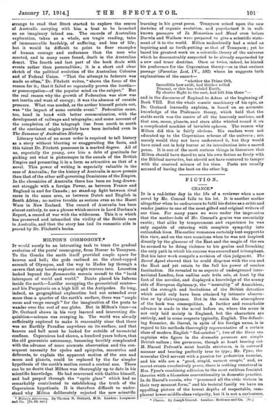MILTON'S COSMOGONY"
Ir would surely be an interesting task to trace the gradual evolution of the poets' cosmogony, from Homer to Tennyson. To the Greeks the earth itself provided ample space for heaven and hell; the gods reclined on the cloud-rapped summit of Olympus, and the way to Hades lay through a cavern that any heroic explorer might venture into. Lucretius looked beyond the flammantia snoenia mundi to the "lucid inter:pace of world and world." Dante placed his Inferno inside the earth—Lucifer occupying the geometrical centre— and his Pnrgatorio on a high hill at the Antipodes. So long, indeed, as geographical exploration had not extended over more than a quarter of the earth's surface, there was "ample room and verge enough" for the imagination of the poets to wander over the rest of our globe. But in Milton's time—as Dr. Orchard shows in his very learned and interesting die- quisition—science was creeping in. The world was already sufficiently explored to make it reasonably clear that there was no Earthly Paradise anywhere on its surface, and that heaven and hell must be looked for outside of terrestrial confines. Copernicus had shown, a hundred years before, that the old geocentric astronomy, becoming terribly complicated with the advance of more accurate observation and the con- sequent necessity for cycles and epicycles, eccentrics and deferents, to explain the apparent motion of the sun and moon and planets, could be replaced by the far simpler hypothesis of the earth's motion round a central sun. There can be no doubt that Milton was thoroughly up to date in his scientific knowledge. He had conversed with Galileo himself, and had peeped through the "optic glass" which had so remarkably contributed to establishing the truth of the Copernican hypothesis. It is therefore difficult to under- stand why Milton deliberately rejected the new scientific • Nittoo's Adrommy. By Themes N. Orchard, N.D. London: Loogmons and Co. Vs. ed. nat.] learning in his great poem. Tennyson seized upon the new doctrine of organic evolution, and popularized it in well- known passages of In Memoriam and Maud even before Darwin and Wallace were prepared to give a scientific state- ment of it to the world. Milton undoubtedly bad a mind as inquiring and as forth-putting as that of Tennyson; yet he based his greatest work on a scientific theory of the universe which he demonstrably suspected to be already superseded by a new and truer doctrine. Once or twice, indeed, he hinted his preference for the Copernican theory—as in that curious passage (Paradise .Lost, IV., 592) where he suggests both explanations of the sunset— "whether the Prime Orb,
Incredible how swift, had thither rolled Diurnal, or this less volubil Earth,
By shorter flight to the east, had left him there"—
and in the discourse of Raphael to Adam at the beginning of Book VIII. But the whole cosmic, machinery of his epic, as Dr. Orchard learnedly explains, is based on an accurate knowledge of the Ptolemaic theory, which held that the stable earth was the centre of all the heavenly motion., and that sun, moon, planets, and stars alike whirled round it on a complicated machine of invisible spheres. The reason why Milton did this is fairly obvious. His readers were not educated up to the Copernican scheme of the universe; not merely would they not have understood it, but. they would have cried out in holy horror at its introduction into a sacred poem. It is one of the most curious things in literature that Milton should have dared to mix his own fiction so freely with the Biblical narrative, but should not have ventured to tamper with the received science of his time. Poets are usually accused of having the boot on the other leg.










































 Previous page
Previous page